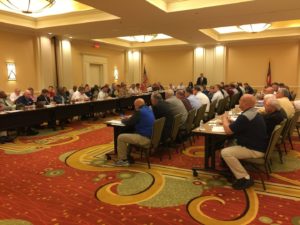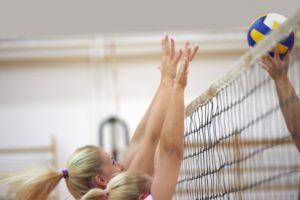North Carolina volleyball player injured by trans athlete tells her lawmakers to make a change
A female high school student injured in a volleyball game by a trans-identifying biological male on the other team testified in support of a North Carolina bill to ban transgender athletes from…

A female high school student injured in a volleyball game by a trans-identifying biological male on the other team testified in support of a North Carolina bill to ban transgender athletes from girls sports.
Payton McNabb suffered a concussion and neck injury last September when a biological male opponent spiked a volleyball directly into her face, knocking her to the ground.
McNabb continues to face anxiety and depression stemming from the event, she says, along with regular headaches, impaired vision, and partial paralysis on the right side of her body. McNabb also says that the lingering effects of the injuries have required accommodation during her school day as her ability to retain and understand information has been impaired.
The Hiwassee Dam High School senior testified before state lawmakers April 19, sharing her story and calling for change.
While the North Carolina High School Athletic Association’s policy allows for biological males who identify as transgender to compete in women’s sports, H574, the Fairness in Women’s Sports Act, would make the determining factor for an athlete’s participation to be their “reproductive biology and genetics at birth.”
The House voted 73-39 to pass, the same day as McNabb’s testimony, sending it to the Senate where it is being considered.
Republican Rep. Kristin Baker, the bill’s primary sponsor, said that the bill is not meant to be exclusive, but to “allow fair and particularly safe, physically safe, competition.”
Opponents of the bill claimed the bill is a result of bigotry instead of safety.
“It is a pretext for bigotry and part of a larger effort to ban transgender people from living their lives,” claimed Democratic Rep. Vernetta Alston, who also asserted that injuries happen in all sports, regardless of who participates.
But McNabb disagrees.
“Allowing biological males to compete against biological females is dangerous. I may be the first to come before you with an injury, but if this doesn’t pass, I won’t be the last,” McNabb warned lawmakers.
Female athlete advocate Riley Gaines, the All-American Kentucky swimmer who faced trans swimmer Lia Thomas, traveled to support McNabb and the Fairness in Women’s Sports Act.
“Watch the clip of Payton McNabb getting spiked in the face by a male competing with the women. Then watch her testimony she gave today for the first time publicly,” Gaines Tweeted after the hearing. “I was honored to stand alongside her in NC to continue the fight to protect women’s sports.”
McNabb knows her days of athletic competition are drawing to a close, but says her fight is bigger than her as an individual.
“I’m not here for me because I know that my time playing is coming to an end,” McNabb said. “I’m here for every biological female athlete behind me. My little sister, my cousins, my teammates.
“My ability to compete was taken from me. Having to play against biological males is not a level playing field, and it is most definitely not safe.”
McNabb’s testimony played a pivotal role in contextualizing the bill, and a return to fair competition in North Carolina appears imminent.
The Senate approved its own version of the bill, leaving the two chambers to negotiate a final version of the bill to send to Gov. Roy Cooper’s desk.



